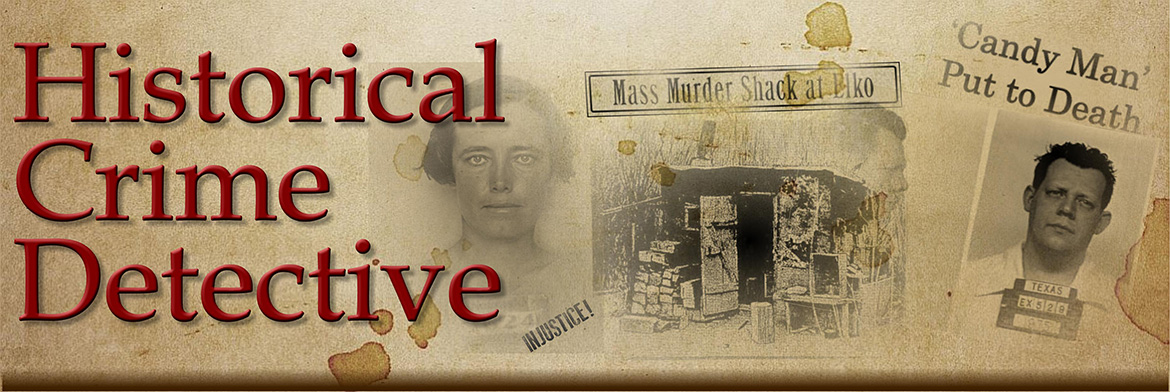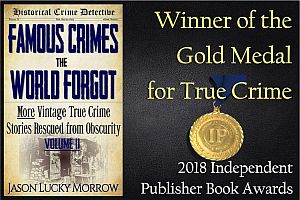Mass Murderer James C. Dunham, San Jose, 1896, Never Captured
Story by Thomas Duke, 1910
“Celebrated Criminal Cases of America”
Part II: Pacific Coast Cases
James C. Dunham was a native of Santa Clara County, Cal., and at the time of his disappearance he was 32 years old.
His mother died in San Jose in 1893, and it is said that she was possessed of such an ungovernable temper that she was known as “Kate the Terror.” Her disposition seems to have been inherited by her son James, who was extremely violent when his temper was aroused.
Ordinarily, he was gentlemanly and ambitious to improve his mind. At various times he followed the occupation of nurseryman, drummer, bicycle-agent, confectioner, orchardist, and at the time of the murders he was studying law.
On May 26, 1896, he was stopping at the home of his father-in-law, Col. McGlincy, which was in the country, a short distance from San Jose, Cal.
On that evening, Col. McGlincy, Jas. Wells, Mrs. McGlincy’s son by a former husband, and George Schaible, their hired man, drove to a nearby village called Campbell, and returned about 11:30 p. m. They took the horse and buggy to the barn and after the horse was unhitched, McGlincy and Wells crossed over to the house, leaving Schaible in the stable. Soon after these two men entered the house, Schaible heard several pistol shots and immediately after that McGlincy ran from the residence over to a chicken house, pursued by Dunham, who had a pistol in his hand.
Dunham fired several shots into the building and McGlincy, who had been wounded, came out and pleaded for mercy. He then fell and as he lay on the ground, Dunham shot him to death. Schaible concealed himself in the hay and Dunham searched for him, but failing to find him, he saddled up a horse and galloped away, pistol in hand. L. C. Ross, a neighbor of McGlincy’s, heard the first shots and after hurriedly dressing, ran to the McGlincy home. Upon seeing McGlincy’s body in the yard, he hurried home to procure a shotgun, and while en route, he heard a horse galloping up the road.
After arming himself, he aroused another neighbor named Page, and they proceeded to the McGlincy home. There, at the midnight hour, they were confronted by a horrible spectacle. In addition to the body of McGlincy in the yard, they entered the house and found Wells shot to death, Mrs. McGlincy and her daughter, the murderer’s wife, were stabbed to death and two employees named Minnie Schessler and Robert Briscol were hacked with a hatchet until their bodies could hardly be recognized.
The only human being within reach of this butcher, who was not slaughtered, was his own little baby, scarcely a month old.
The appearance of the house indicated that a terrible struggle for life was made by some of the victims. Blood was spattered over the walls, and furniture and bric-a-brac was knocked down and broken.
While riding away from the scene of his bloody deeds, Dunham passed Charles Sterritt on the San Jose road. The murderer, who still had his revolver in his hand, asked Sterritt where he was going and who he was looking for. The next time he was seen was on the following evening at 6:30 p. m., when he conversed with Manager Snell of the Smith’s Creek Hotel. Dunham was bloodstained and his horse was hardly able to stand from exhaustion. He then rode off toward the mountains and no further trace was found of him until May 29, when his horse was found abandoned in Indian Gulch, five miles from Mount Hamilton.
The reward offered for the capture of Dunham amounted to $2200.00.
People from all parts of the United States were constantly “locating” the fugitive and the authorities were put to considerable expense in investigating these false clues.
But the most remarkable case of mistaken identity occurred on September 5, 1908, when a woman residing in Sherman, Texas, reported to the authorities of that place that she was well acquainted with Dunham and positively identified a man living in that community under the name of William Hatfield as the much-sought murderer. He was arrested and as he gave a most unsatisfactory account of his movements, both previous and subsequent to the date of the murder, Sheriff Langford of Santa Clara County went to Texas, and after a legal battle, during which considerable jealousy was exhibited, because of the amount of the reward money involved, the suspect was finally extradited.
On October 23, Hatfield arrived in San Jose, where it was proven beyond all doubt that he was not the man wanted, but it was necessary to charge him, and immediately afterward he was legally exonerated.
It is estimated that while he was incarcerated in San Jose, over twenty thousand people visited him.
It was never definitely learned what motive prompted Dunham to commit this foul deed.
There was nothing to indicate that it was premeditated and the general belief is that he had some real or imaginary grievance and that the ungovernable temper which he is said to have inherited changed him for the moment into a fiend.
It seems impossible that Dunham could have escaped or even lived for many days after his horse fell from exhaustion.
His deeds, name and description were on every tongue throughout that part of the country, and every man who answered his description in any respect was detained pending investigation unless his identity was proven beyond all doubt. He had no means to disguise himself and although he had no provisions, he never applied to a living soul for food or shelter, and no human being could have made any progress over that mountainous country without proper nourishment.
Every avenue of escape was guarded, either by officers or those who were anxious to assist in his apprehension, either in the interest of justice, or to procure the large reward.
The naturally melancholy Dunham, alone and exhausted in the wild mountains, without a friend, hunted like a ferocious animal, and seeing no avenue of escape, and once captured, no escape from the gallows, probably realized the enormity of his crimes, for he was possessed of more than ordinary intelligence, and then decided to seek some isolated spot where he probably ended his miserable existence.



